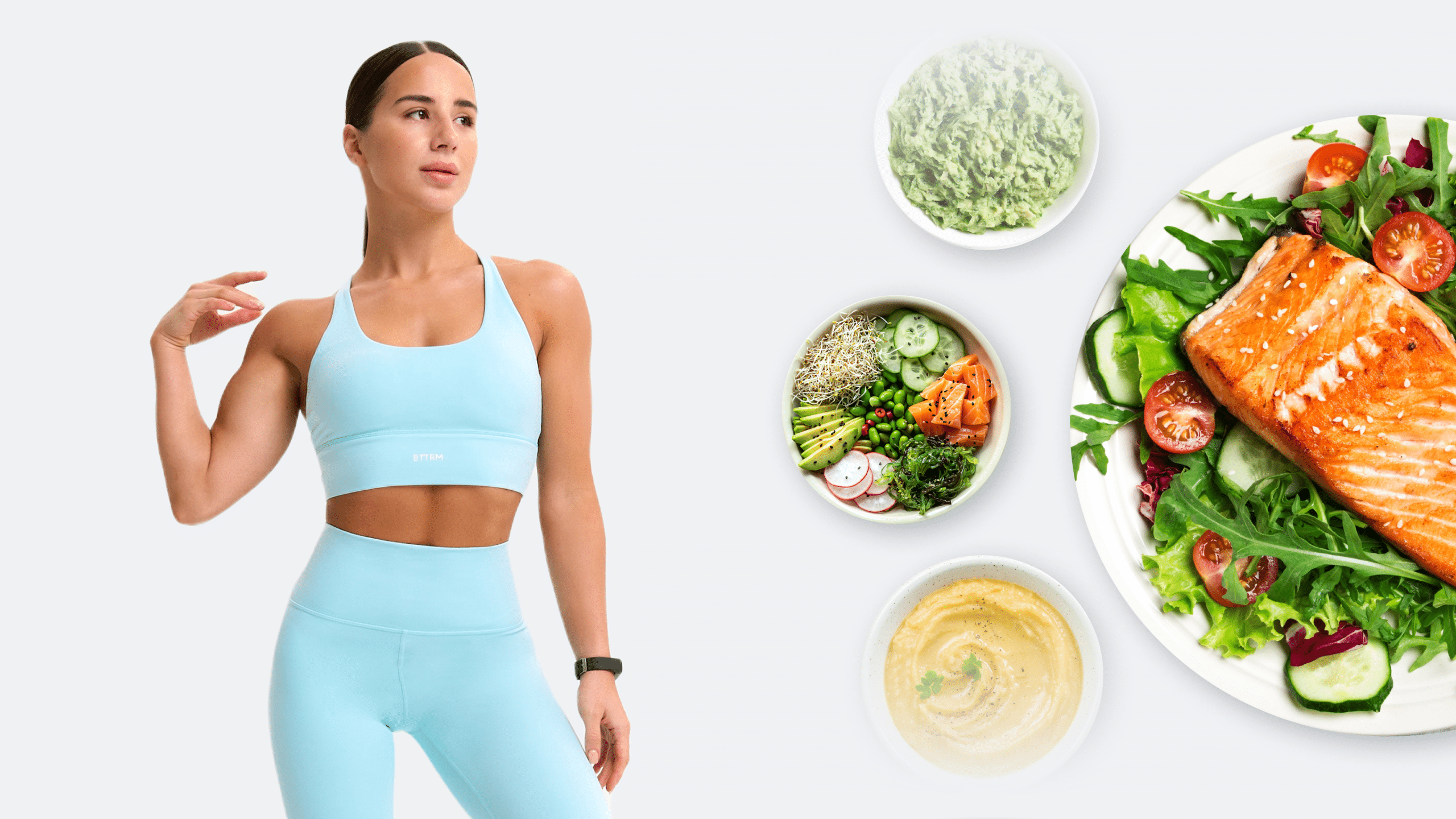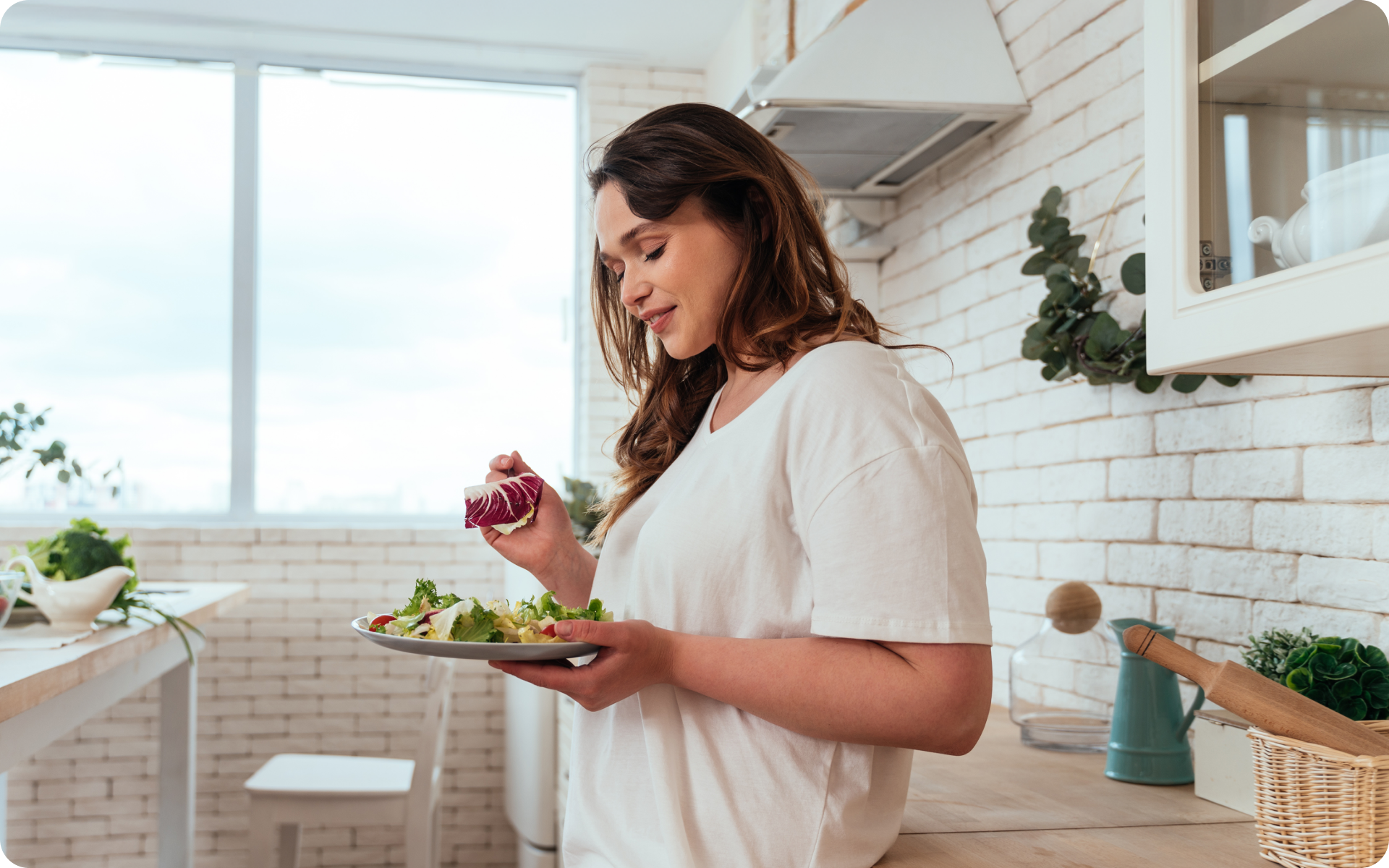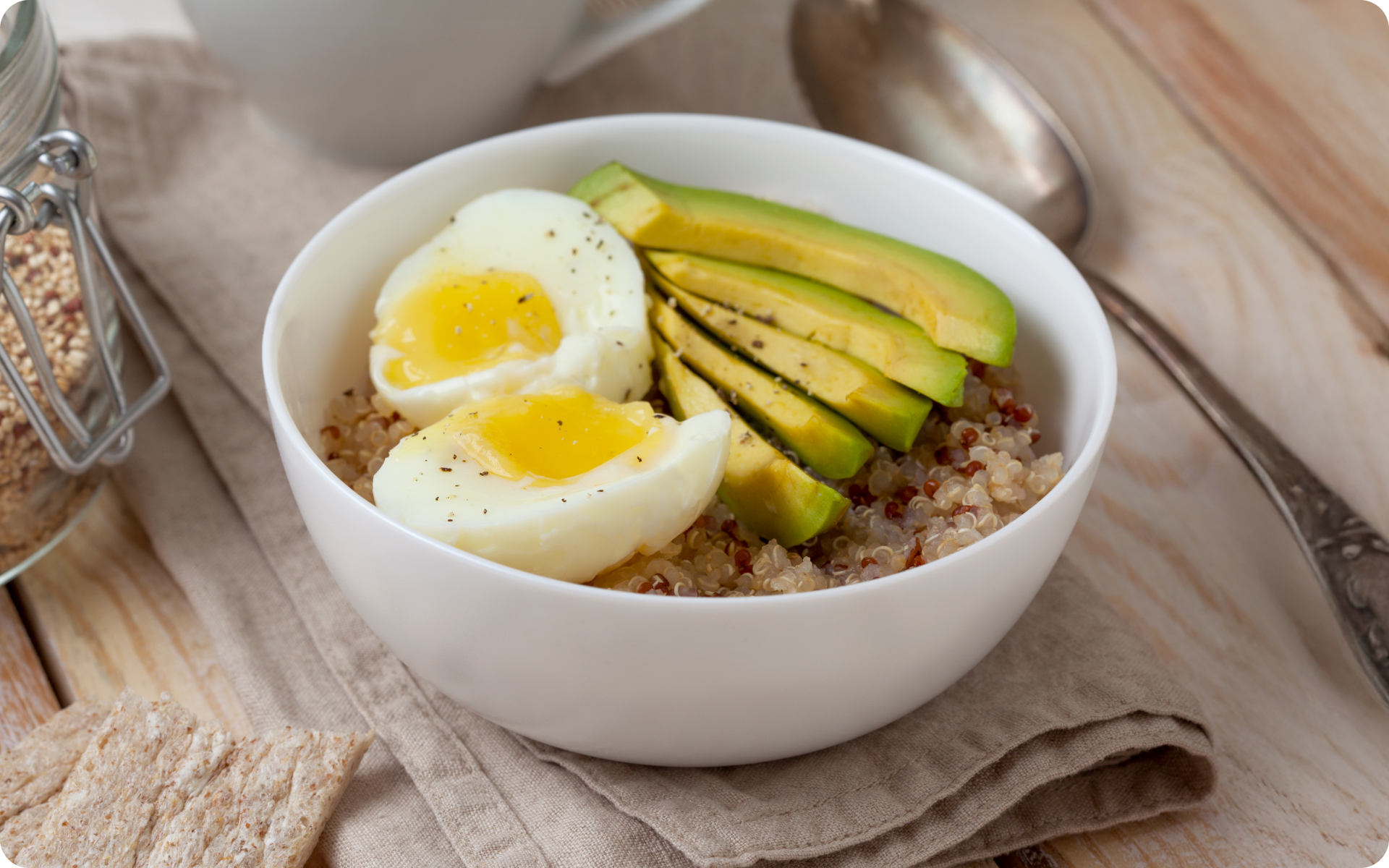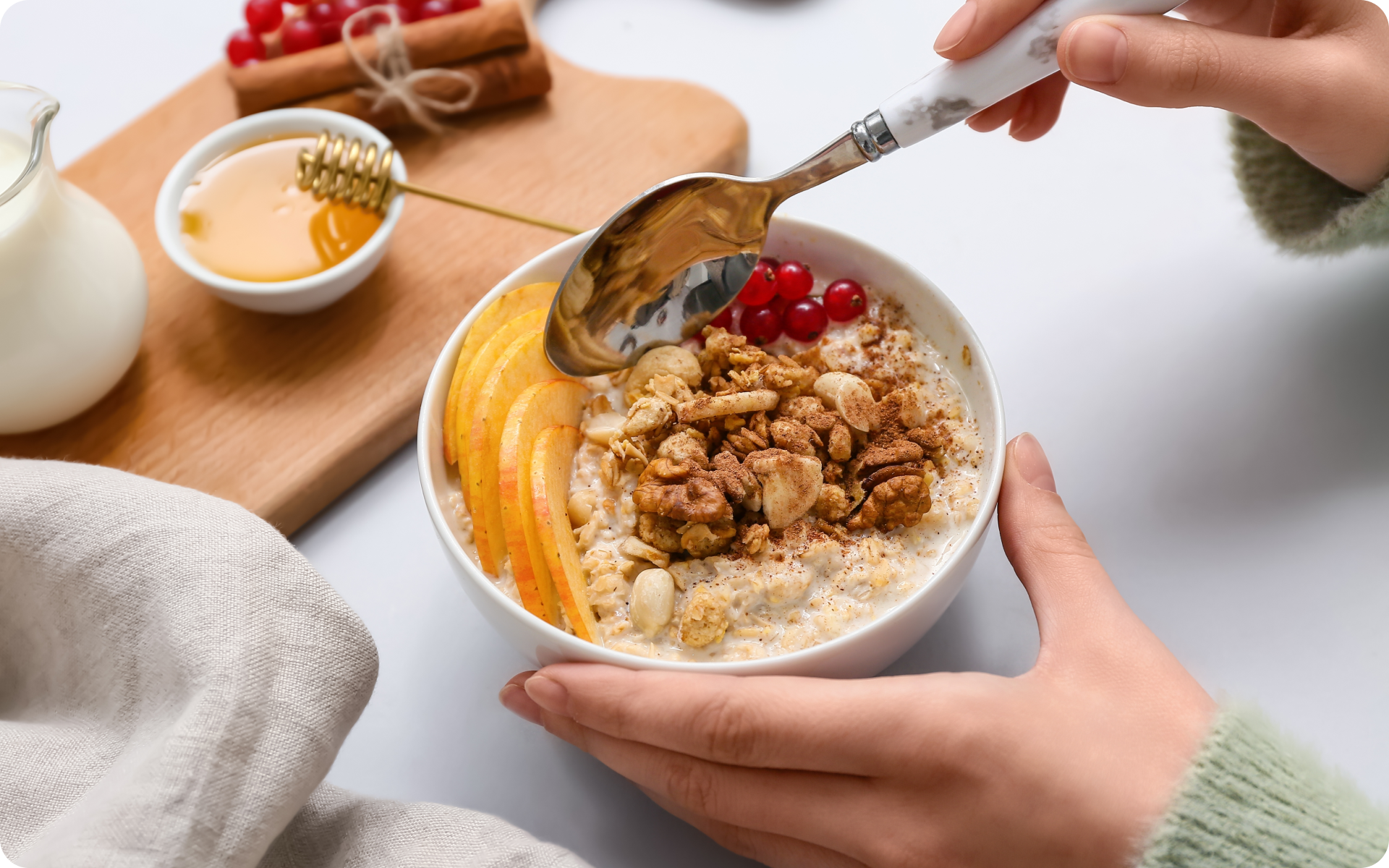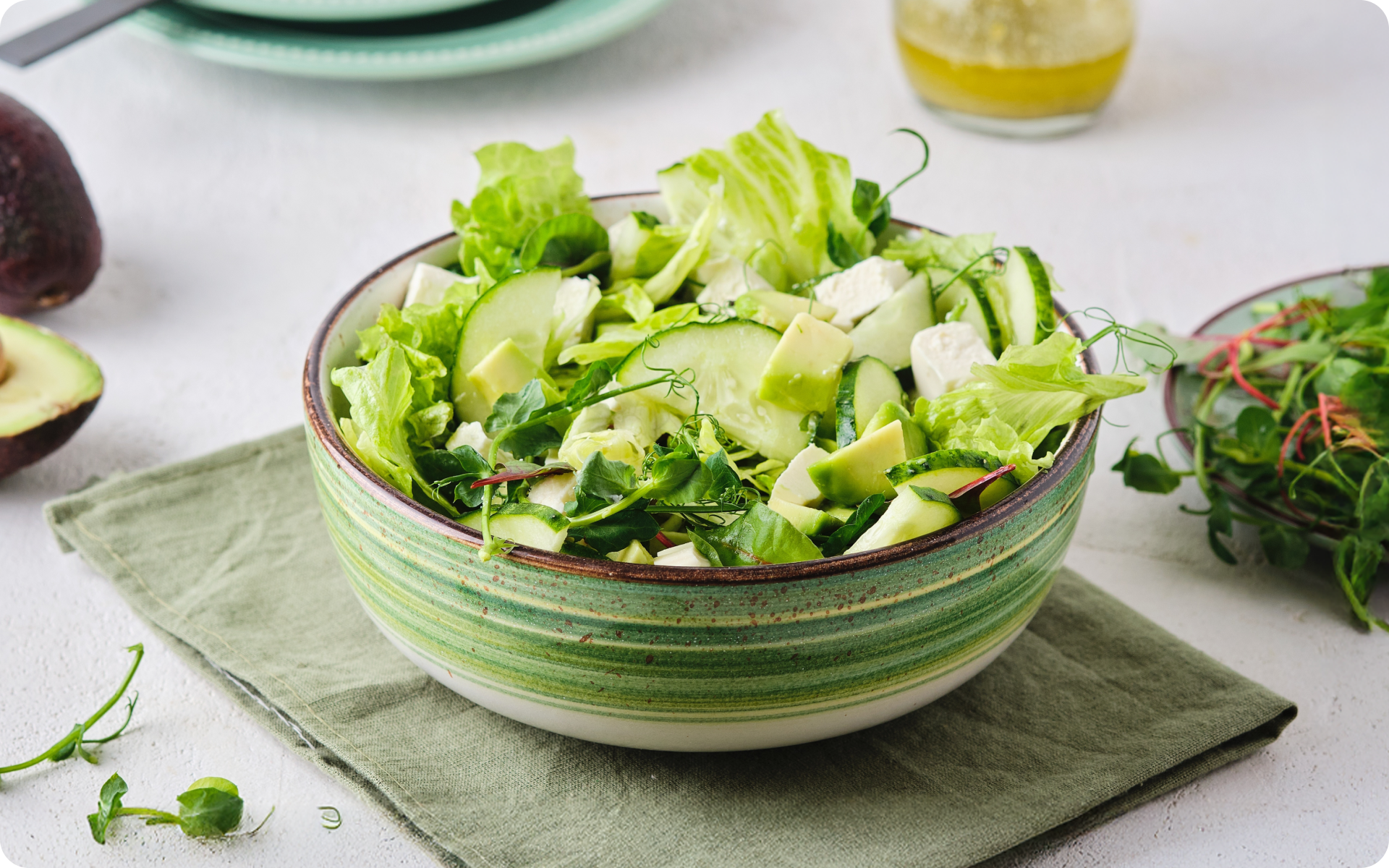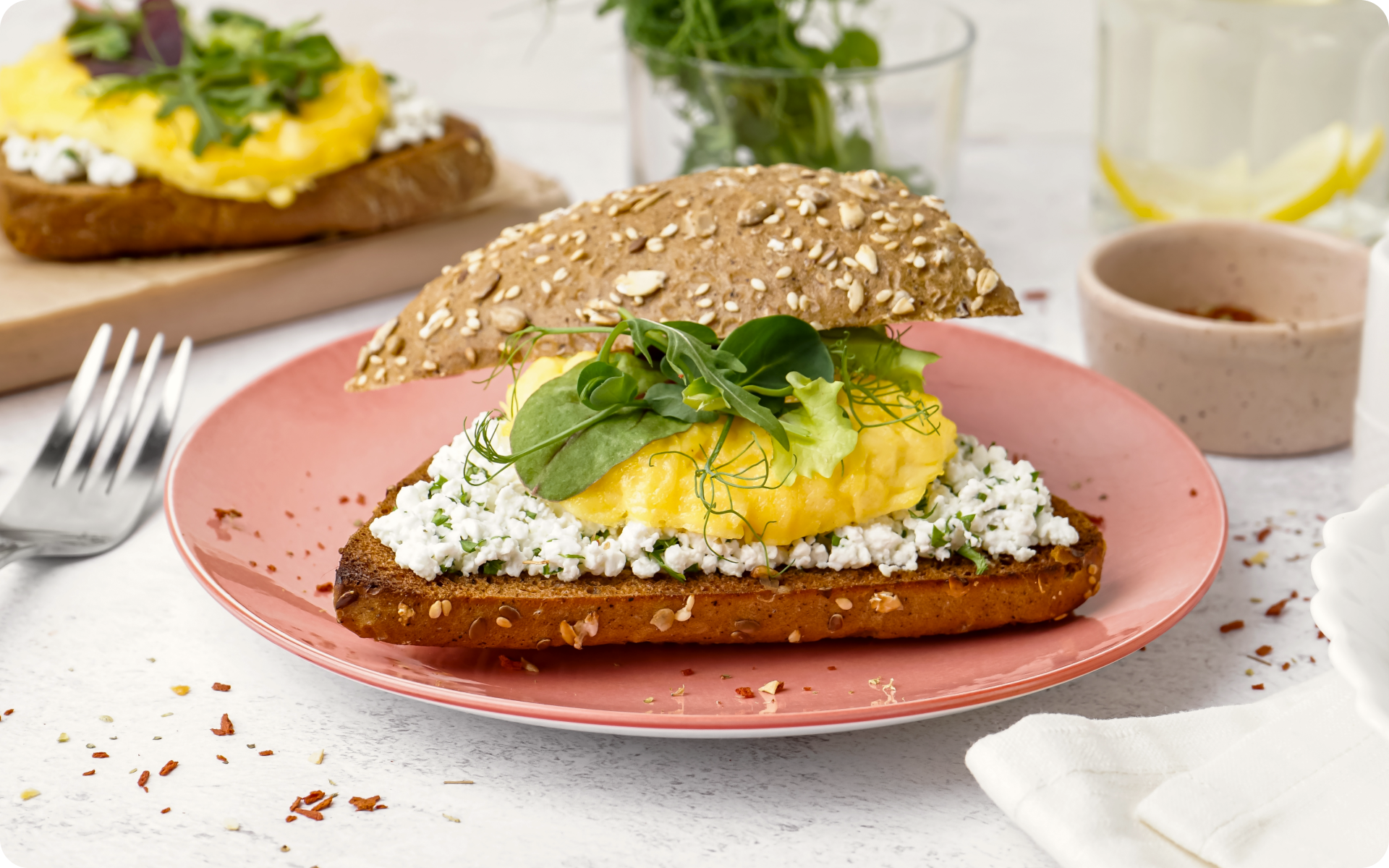Have you ever considered trying a low-carb eating plan for weight loss? If you have, then the 30-day keto challenge could be the answer to your dieting and weight loss problems.
In this article, we’re going to discuss what a 30-day keto challenge is, what foods you can consume while on it, and which foods are forbidden from this eating plan.
What Is the Keto 30-Day Challenge?
Essentially, it’s a 30-day test where you only eat foods and meals that follow the keto way of life. But what is a keto diet? It is an extremely low-carb, high-fat eating plan. Those attempting this eating plan are required to drastically reduce the amount of carbs they consume a day and replace the deficit with fat (7).
An important fact to note is that while keto is essentially considered a low-carb diet, it should not be put in the same category as other low-carb diets that are available today. Unlike the other plans that focus more on your protein intake, this eating plan dials up your fat intake and keeps your protein intake moderate (12).
Therefore, on the 30-day keto challenge, you’ll be consuming meals that are high-fat, low-carb, and moderate-protein – remember that too much protein may interfere with the ketosis process, something that you’re trying to achieve on this challenge.
30-Day Keto Basics Challenge: What Are Some Important Facts to Know Before Attempting This Month-Long Eating Plan?
When you look up tips on how to start losing weight for beginners, one of the most commonly stressed points is making changes to your diet. The keto diet is on the list of the most popular diets that will be recommended to you.
Scientific research on this eating plan continues to show that it can be effective in helping overweight and obese participants lose weight (1, 10, 5). However, it still requires a calorie deficit, and isn’t necessarily more effective than other reduced-calorie diets in the long term. Furthermore, its long-term health implications aren’t fully understood, and it isn’t effective or appropriate for everyone. Talk to your healthcare provider to get individualized advice.
It’s best to first educate yourself on the rules and the ins and outs of this diet if you’re thinking of trying it. Here are some important facts to know before attempting the 30-day keto challenge.
Reasons why BetterMe is a safe bet: a wide range of calorie-blasting workouts, finger-licking recipes, 24/7 support, challenges that’ll keep you on your best game, and that just scratches the surface! Start using our app and watch the magic happen.
How Much Carbs Can You Have in a Day?
As previously stated, this eating plan is rather strict on its carbohydrate intake and the matter of how many carbs per day can be consumed on the 30-day keto diet challenge is one of the first things that anyone who is thinking of attempting this eating plan should establish.
When following the 30-day keto challenge, 55 to 60% of your food energy intake should come from fats, 30 to 35% from protein, and just 5 to 10% should be from carbs. This means that if you’re consuming a 2,000 kcal diet, your carbohydrate intake should be between 25 and 50 grams per day (7).
However, it should be noted that these recommended percentages can sometimes vary.
If you want to be even stricter with your carbohydrate intake, you can follow the original classic ketogenic guidelines where your carb intake will be just 10 to 15g per day. On such a plan, your protein intake would be determined by your weight at the ratio of one gram of protein per kilogram of body weight with the remaining calories covered by fats (1).
Despite the changes in percentages, the remaining constant is that most people’s number of carbs per day on the 30-day keto challenge does not exceed 50 grams (4).
Now that you know how to start a 30-day keto challenge, here’s a simple meal plan to help you better understand how to go about this challenge.
What Foods to Avoid
As mentioned above, this meal plan is quite restrictive when it comes to your carbohydrate intake. To help you stay true to the eating plan, here are some foods and drinks that should typically be avoided when on the 30-day keto challenge:
- Grains. They are quite high in carbs and will likely take your body out of ketosis. Examples of grains include rice, quinoa, oats, corn, and buckwheat. Bread and pasta made from wheat or other grains should also be avoided.
- Most fruits. As most popular fruits such as mangoes, bananas, oranges, apples, and pears are quite high in sugar and carbs, people attempting the 30-day keto challenge are generally advised to avoid them. However, you’ll be allowed to consume some low-glycemic options such as berries, avocados, tomatoes, and olives.
- High-carb vegetables. While most vegetables are quite low in carbs, some tend to contain a lot of starch and are high in carbs. You should avoid starchy vegetables such as sweet potatoes, yams, cassava, parsnips, and white potatoes.
- Legumes and lentils. Like grains, they’re quite high in carbs and not keto-friendly.
- Sugary drinks and alcohol. They’re high in sugar, which is something that is highly discouraged on keto. As for alcoholic drinks, some options such as wine, whiskey, light beer, rum, and gin can be consumed while on this challenge, but only in moderation.
What to Eat on the 30-Day Keto Challenge
The following foods are considered to be keto-friendly (4):
- All kinds of meats, including organ meats and poultry. However, for heart health, it’s ideal to choose mostly lean and unprocessed meats.
- Fatty fish such as salmon, sardines, and mackerel, and other seafood such as shrimp and crabs. Please note that while most fish and other seafood have zero carbs, others such as oysters and octopus have a small amount of carbs, so if you want to include them in the challenge, you must keep that in mind.
- Non-starchy vegetables, including leafy greens, cauliflower, bell peppers, zucchini, cucumbers, eggplants, asparagus, and onions.
- Full-fat dairy such as butter, cream, and cheeses. Please note that while dairy products like these are allowed on the diet, milk and ice cream are not. Ice cream contains added sugars while milk, particularly whole milk, contains lactose, a kind of milk sugar and also a carbohydrate (14, 8).
If you want to consume milk on this challenge, we encourage you to look for low-carb substitutes. Unsweetened plant milks such as soy, almond, and coconut milk are fantastic keto-friendly alternatives.
- Drinks – water, bone broth, and unsweetened coffee and tea.
- Nuts and seeds – While all kinds of seeds such as sunflower, chia, pumpkin, sesame, hemp, and flax are keto-friendly, some nuts can be higher in carbs than others. Nuts that are included in the 30-day keto challenge include macadamia, walnuts, almonds, and pecans.
- Oils – Put away the cooking sprays and enjoy using oils in your cooking. Vegetable oils, olive oil, avocado oil, and others are encouraged in this challenge.
- Berries – As previously stated, these are some of a limited number of fruits that are included in this diet, so make sure you’re not just consuming them for their weight loss benefits but also their antioxidants that have disease prevention and health-boosting benefits (2, 11).
If you don’t enjoy eating fruit, you can make it fun by doing a 30-day smoothie diet challenge alongside the keto challenge. No, we don’t mean just have smoothies for the challenge but use the berries plus some leafy greens (and full-fat yogurt) to make some delicious smoothies during the month-long diet.
Read more: Is Pho Keto? The Ultimate Guide to Enjoying Pho on a Low-Carb Diet
How Much Weight Can You Lose in 30 Days on Keto?
There is no way to accurately tell how much weight an individual can lose while on this or any other plan.
When it comes to body weight and weight loss, the determinants of how much you weigh and how fast you can lose it include your genetic makeup, age, sex, level of physical activity, starting weight, how much sleep you get a night, and the extent of your calorie deficit (6).
As these factors are incredibly specific to an individual, we cannot provide one single answer that covers everyone.
However, the Centers for Disease Control and Prevention states that healthy weight loss is generally a loss of 1 to 2 pounds a week (13). If we follow these guidelines, we can say that if you’re following the diet correctly and include exercise in your plan, you can expect to lose anything between 4 and 8 pounds in 30 days.
Full-body workouts are among the best exercises you can do to help you achieve this goal. The 30-day plank challenge for beginners is one routine you can easily adopt to work up a sweat and lose some weight. It’s important to remember that planks are full-body workouts, not just core/abs exercises.
Free Sample of a Keto 30-Day Challenge Meal Plan
The following keto 30-day challenge recipes will help you get started on your high-fat, low-carb eating plan for weight loss.
Please note that the calories for each day vary, so make sure to increase or decrease the serving sizes to fit your recommended calorie and macro intake for the day. You can also add healthy keto snack options if the calories in any day are too low for you.
Day One
Meal 1 – Berry-Avocado Smoothie
Ingredients – 1 cup water, 1/2 medium-sized avocado, 2 cups baby spinach, 2 tbsp hemp seeds
Method – Place all the ingredients in a blender and blend them all together till smooth. Pour into a cup and enjoy.
Calories: 280, Fats: 19 g, Proteins: 10 g, Carbs: 19 g.
Meal 2 – Cobb Salad
Ingredients – For the chicken – 1 chicken thigh, 1/2 tsp fresh oregano, 1/2 tsp lemon zest, 1/2 tsp olive oil, 1 garlic clove, salt and pepper to taste
For the dressing – 75 g mayonnaise, 75 g full-fat coconut milk, 1/2 tbsp lemon juice, 1/4 garlic clove, 1/2 tsp capers, 1/2 tsp fresh oregano, 1/4 tsp salt
For the salad – 1/4 head romaine lettuce, 235 g spinach, 1 boiled egg, 1/8 large avocado, 1/8 large cucumber, 60 g cherry tomatoes, 75 g olives, 75 g cooked bacon
Calories: 588, Fats: 42 g, Proteins: 38 g, Carbs: 17 g.
Meal 3 – Greek Salad
Ingredients – 1 1/2 ripe tomatoes, 1/4 cucumber, ¼ red onion, 1/4 green bell pepper, 100 g feta cheese, 5 black Greek olives, 2 tbsp olive oil, 1/4 tbsp red wine vinegar, 1 tsp dried oregano, salt and pepper to taste
Method – Cut the tomatoes and cucumber into bite-sized pieces. Thinly slice the bell pepper and the onion. Add feta cheese and olives and drizzle olive oil and vinegar over the salad. Season with salt and pepper according to taste. Sprinkle with crumbled oregano and serve.
Calories: 593, Fats: 51 g, Proteins: 17 g, Carbs: 15 g.
Total Intake for the Day: Calories: 1,461, Fats: 113 g, Proteins: 65 g, Carbs: 51 g.
Day Two
Meal 1 – Chocolate-Almond-Coconut Smoothie
Ingredients – 1/2 cup full-fat coconut milk, 2 tbsp unsweetened cocoa powder, 1 cup almond milk, 1 tbsp coconut oil, 1/2 tbsp almond butter
Method – Place all your ingredients in a blender and blend till smooth. You may add some ice cubes to help thicken your drink.
Calories: 392, Fats: 27 g, Proteins: 13 g, Carbs: 26 g.
Meal 2 – Stuffed Avocados
Ingredients – 226 g ground beef, 1/2 tbsp chili powder, 1/4 tsp salt, 1/3 tsp cumin, ¼ tsp dried oregano, 1/8 tsp garlic powder, 1/8 tsp onion powder, 57 g tomato sauce, 1 1/2 avocados, 1/2 cup shredded cheddar cheese, 1/8 cup sliced cherry tomatoes, ⅛ cup shredded lettuce, cilantro, sour cream
Method – Cook the ground beef until browned. Drain the grease and add the seasonings and tomato sauce. Load the avocado skin with the taco meat, and top with cheese, tomatoes, lettuce, cilantro, and sour cream.
This recipe makes 3 servings.
Calories: 278, Fats: 22 g, Proteins: 18 g, Carbs: 2 g.
Meal 3 – Egg and Bacon Salad
Ingredients – 225 g green asparagus, 40 g cooked bacon, 2 large, halved hard-boiled eggs, 1 tbsp avocado oil, 1 tbsp red wine vinegar, 1/2 tbsp Dijon mustard, 1/2 tbsp bacon fat, 1/2 garlic clove, half a pinch of salt, chili flakes
Method
- Cut the asparagus into 3 to 5 cm segments and drop them into boiling water for 3 to 4 minutes, then take them out of the water and drop them into an ice bath.
- In a small bowl, combine the oil, vinegar, mustard, bacon fat, garlic, salt, and pepper flakes. Plate the asparagus.
- Sprinkle the bacon over the asparagus and arrange the hard-boiled eggs over all of them. Drizzle with the vinaigrette and enjoy.
Calories: 542, Fats: 46 g, Proteins: 22 g, Carbs: 6 g
Total Intake for the Day: Calories: 1,212, Fats: 95 g, Proteins: 53 g, Carbs: 34 g.
Day Three
Meal 1 – Keto Protein Smoothie
Ingredients – 2 tbsp cacao butter, 1 cup unsweetened coconut milk, 1 scoop protein powder, 1/2 tbsp MCT or coconut oil, 1 tbsp chia seeds, ice cubes
Method – Place all the ingredients in a blender and blitz till the mixture is smooth.
Calories: 369, Fats: 18 g, Proteins: 28 g, Carbs: 26 g.
Meal 2 – Mac and Cheese
Ingredients – 1/4 head cauliflower chopped into florets, 3/4 tbsp butter, 1/4 cup cheddar cheese, 8 g heavy cream, 8 g unsweetened almond milk
Method
- Preheat the oven to 232°C and line a baking sheet with foil. Melt some butter, drizzle it on the cauliflower florets, season with salt and pepper, and toss everything together.
- Place the cauliflower florets on the lined baking sheet and roast for approximately 10-15 minutes until they’re crisp-tender.
- Heat the cheddar cheese, heavy cream, milk, and remaining tablespoon of butter, stirring frequently until everything is smooth. Toss the cauliflower with cheese sauce right before serving.
Calories: 294, Fats: 23 g, Proteins: 11 g, Carbs: 12 g.
Meal 3 – Baked Salmon
Ingredients – 3 g olive oil, 150 g salmon filets, 35 g butter, a pinch of black pepper and salt, 1/4 lemon
Method
- Preheat the oven to 200°C.
- Grease a large baking dish with olive oil and place the salmon in the dish, skin-side down.
- Place the lemon on the salmon and cover the fish with half the butter. Put it in the oven and bake for 20 to 30 minutes.
- Melt the remaining butter and then add some lemon juice to it. Serve the salmon with the lemon butter.
Calories: 573, Fats: 41 g, Proteins: 37 g, Carbs: 1 g.
Total Intake for the Day: Calories: 1,236, Fats: 82 g, Proteins: 76 g, Carbs: 39 g.
BetterMe app will provide you with a host of fat-frying fitness routines that’ll scare the extra pounds away and turn your body into a masterpiece! Get your life moving in the right direction with BetterMe!
Day Four
Meal 1 – No Bread Sausage-Egg Sandwich
Ingredients – 2 eggs, 3/4 tbsp heavy cream, 1/3 tbsp butter, 1 slice cheddar cheese, 2 sausage patties, 1/2 medium-sized avocado, a pinch of black pepper, salt, chili flakes
Method
- Place the eggs, heavy cream, and red pepper flakes in a small bowl and season with salt and pepper. Beat them together until they’re mixed.
- Place some butter in a hot nonstick pan and once it melts, pour the eggs and heavy cream mixture into the pan.
- Place the slice of cheese in the middle and let it sit for a minute. Slice the avocado into strips. Fold the sides of the egg into the middle, covering the cheese, and then remove from the heat.
- Serve the egg and avocado between the two heated sausage patties.
Calories: 611, Fats: 50 g, Proteins: 27 g, Carbs: 13 g.
Meal 2 – Avocado Salmon Salad
Ingredients – For the dressing – 1⁄3 tbsp lime juice, 20 g mayonnaise, 20 g sour cream, 1⁄6 minced garlic clove, 1⁄6 tsp salt, 10 g finely minced red onions, 7 g white pepper
For the salad – 75 g cooked shrimp, 75 g cooked salmon, 15 g chopped tomatoes, 7 g chopped cucumber, 1/6 avocado, 1/3 tbsp fresh basil
Method
- Combine the lime juice, mayonnaise, sour cream, garlic, salt, pepper, and onion in a bowl and set aside.
- In a bigger bowl, toss together the salmon, shrimp, avocado, cucumber, and tomato. Pour the dressing over this and toss gently to combine.
- Serve immediately or chill for 20 to 30 minutes before consuming
Calories: 439, Fats: 34 g, Proteins: 27 g, Carbs: 4 g.
Meal 3 – Broccoli Salad
Ingredients – 8 cups fresh broccoli, 1/4 cup diced red onion, 1/2 cup sunflower seeds, 113 g cheddar cheese, 3/4 cup mayonnaise, 5 tbsp low-carb sweetener, 2 tbsp apple cider vinegar, 226 g cooked bacon.
Method
- Combine the broccoli, red onion, sunflower seeds, and cheese in a large bowl.
- Mix the mayonnaise, sweetener, and vinegar together until smooth, then pour it into the salad and toss.
- Let the salad chill in the fridge for a couple of hours before serving.
This recipe makes 10 servings.
Calories for one serving: 266, Fats: 25 g, Proteins: 8 g, Carbs: 4 g.
Total Intake for the Day: Calories: 1,316, Fats: 109 g, Proteins: 62 g, Carbs: 21 g.
Day Five
Meal 1 – Low-Carb Pancakes
Ingredients – 60 g almond flour, 1 1/2 tbsp pea protein powder, 2 ½ g ground psyllium husk powder, a pinch of ground cinnamon and salt, 125 ml unsweetened almond milk, 3/4 tsp vanilla extract, 1 tbsp unsweetened applesauce, coconut oil
Method
- Mix the dry ingredients together in a bowl and then stir in the almond milk to create a thick batter. Add the vanilla extract and the unsweetened applesauce and mix well.
- Add some coconut oil to a hot non-stick pan. Pour the batter into the pan and cook as you would ordinary pancakes.
Calories: 414, Fats: 32 g, Proteins: 19 g, Carbs: 5 g.
Meal 2 – Keto Meatballs
113 g lean ground beef, 113 g ground pork, 17 g grated Parmesan cheese, 17 g heavy cream, 1/2 large egg, 1 tbsp minced fresh parsley, 1/2 tbsp finely grated onion, 1/2 grated clove garlic, 1/4 tsp salt, 1/8 tsp pepper
Method
- Preheat the oven to 204°C.
- Add the beef and pork to a medium bowl and break up into smaller chunks, aiming for an even mix.
- Add the remaining ingredients to the meat and mix with a hand mixer until just combined. Be careful not to over-mix. Lightly oil your hands and roll 6 meatballs.
- Place the meatballs on a foil-lined or rack-lined baking sheet and bake them for 15 to 20 minutes.
- Serve with warmed sauce and garnish with chopped fresh parsley.
The calories below do not include a sauce and the recipe makes approximately 2 servings.
Calories: 387, Fats: 22 g, Proteins: 19 g, Carbs: 1 g.
Meal 3 – Lettuce and Ham Sandwich
2 slices cheddar cheese, 2 slices deli ham, and 2 slices lettuce rolled together with 2 tbsp mayonnaise
Calories: 480, Fats: 42 g, Protein: 20 g, Carbs: 4 g
Total Intake for the Day: Calories: 1,281, Fats: 96 g, Proteins: 58 g, Carbs: 10 g.
Day Six
Meal 1 – No Bread Sandwiches
Ingredients – 50 g Romaine lettuce, 15 g mayonnaise, 30 g Gouda cheese, 1/2 medium-sized avocado, 4 cherry tomatoes
Method – Rinse the lettuce leaves thoroughly and shake them to dry. Spread the mayonnaise on the lettuce leaves, then layer the cheese, avocado, and tomato on top.
Calories: 383, Fats: 34 g, Proteins: 10 g, Carbs: 5 g.
Meal 2 – Garlic-Cheese Pork Chops
Ingredients – 340 g boneless pork chops, 1/2 small onion, 1 minced garlic clove, 1 tbsp olive oil, 1/2 cup heavy whipping cream, 14 g cream cheese, 22 g chicken broth, 22 g parmesan cheese, 1/4 cup cheddar cheese, 1/2 tbsp Italian seasoning, 1/4 tsp pepper, salt to taste
Method
- Brown the pork chops, onion, and garlic cloves in 2 tablespoons olive oil in a large skillet on medium-high heat for approximately 3 to 5 minutes on each side.
- Remove the pork chops from the skillet and add the rest of the ingredients.
- Cook on medium heat while stirring occasionally until the sauce thickens.
- Add the pork chops back to the sauce mixture and simmer on low for 5 minutes or until done.
This recipe makes 3 servings.
Calories: 438, Fats: 33 g, Proteins: 30 g, Carbs: 2.7 g.
Meal 3 – Lettuce Wraps
Ingredients – 680 g ground beef, 1/2 tbsp sesame oil, 1/2 onion chopped, 1/4 cup soy sauce, 2 tbsp brown sugar substitute, 1 tsp chili garlic sauce, 1/2 tsp ginger paste, 2 tsp minced garlic, 1/4 cup chopped cashews, green leaf lettuce leaves, salt and pepper to taste
Method
- Heat the sesame oil in a skillet over medium-high heat and then add the chopped onion to the heated skillet. Cook until they soften and start to brown.
- Mix in the ground beef and cook until it is completely browned.
- Stir in the soy sauce, and add the brown sugar substitute, chili garlic sauce, ginger paste, and minced garlic. Stir to combine well.
- Continue to cook down the mixture, lowering the heat to medium until most of the liquid has been absorbed.
- Mix in the chopped cashews and remove the skillet from the heat.
- Allow the mixture to cool for a few minutes, then add spoonfuls of the beef mixture to the green leaf lettuce cups, and top with freshly chopped green onions before serving.
Calories: 408, Fats: 31 g, Proteins: 25 g, Carbs: 4 g.
Total Intake for the Day: Calories: 1,184, Fats: 98 g, Proteins: 65 g, Carbs: 11.7 g.
Day Seven
Meal 1 – Cheese Roll-Ups
Ingredients – 50 g cheddar cheese and 15 g butter
Method – Cut the cheese into very thin slices with a sharp knife. Cover the cheese with butter, roll it up, and enjoy.
Calories: 331, Fats: 30 g, Proteins: 13 g, Carbs: 2 g.
Meal 2 – Keto ‘Oatmeal’
Ingredients – 2 tbsp hemp hearts, 2 tbsp almond flour, 2 tbsp unsweetened shredded coconut, 1 tbsp flaxseed meal, 1 tbsp chia seeds, 1/4 tsp granulated stevia, 1/2 tsp vanilla extract, a pinch of salt
Method – Add all ingredients except the vanilla extract to a small saucepan/pot over low heat. Cook until thickened, stirring constantly, for about 3 to 5 minutes. Take off the heat and stir in the vanilla extract.
Calories: 453, Fats: 36 g, Proteins: 18 g, Carbs: 15 g.
Meal 3 – Butter Shrimp
Ingredients – 4 tbsp unsalted butter, 340 g shrimp, 2 1/2 minced garlic cloves, 16 g chicken stock, juice of half a lemon, 1 tbsp chopped parsley
Method
- Melt 1 tablespoon of butter in a large skillet over medium-high heat. Add the shrimp and salt and pepper to taste. Cook, stirring occasionally, until pink, for about 2-3 minutes, then set aside.
- Add the garlic to the skillet and cook, stirring frequently, until fragrant, for about 1 minute. Stir in the chicken stock and lemon juice. Bring to a boil, reduce the heat, and simmer until it is reduced by half, for approximately 1-2 minutes. Stir in the remaining 3 tablespoons butter, 1 tablespoon at a time, until melted and smooth.
- Stir in the shrimp and gently toss to combine.
This recipe makes 2 servings.
Calories for one serving: 278.3, Fats: 23.3 g, Proteins: 15.5 g, Carbs: 2.6 g.
Total Intake for the Day: Calories: 1,062.3, Fats: 89.8 g, Proteins: 46.5 g, Carbs: 19.6 g.
Read more: 6 Keto Sushi Recipes to Eat on a Low-Carb Diet
What Is the Hardest Week of Keto?
The first week of this challenge will be the hardest of all. Drastically reducing your carb intake can come with some side effects, which are commonly known as the keto flu.
Symptoms of this ‘flu’ include insomnia, fatigue, nausea and vomiting, lack of endurance when exercising, headaches, constipation, and dizziness. Please note that while these symptoms generally last a few days, they may at times last for several weeks (7). If the side effects interfere with your life, stop the diet immediately and consult a healthcare provider.
FAQs
How do I know I’m in ketosis?
Testing ketones in the blood is the most accurate way to tell if you’re in ketosis or not. You can visit a doctor to have this test done and if the tests show that your blood ketone levels are between 0.5 to 3 millimoles per liter, then you’re certainly in ketosis (9).
If you don’t want to go through the blood testing route, you can use at-home testing kits. These tests use either your urine or your breath to check for ketone levels. Experiencing keto flu symptoms is also another simple way to tell if your body is in ketosis. As stated above, these symptoms start in the first week and can last up to 4 weeks (3).
Can I drink alcohol on keto?
That depends on the kind of alcohol you want to drink. Hard liquor such as rum, gin, whisky, brandy, vodka, and tequila, in addition to low-carbohydrate wines and beers are allowed, but only in small amounts. These options are lower in carbs and sugars than other kinds of alcohol and can be consumed (4). Pay attention to what other beverages you mix with your liquor and the sugar content of them.
How long does it take to lose belly fat in ketosis?
As with general weight and fat loss, it’s difficult to say how long losing belly fat will take when you’re on this diet. Remember that gaining weight/fat doesn’t happen overnight, so you won’t lose fat overnight. Losing belly fat can take anything from a couple of weeks to months or even years. It all depends on multiple factors such as your diet, exercise plan, genetics, and starting point.
The Bottom Line
If you’re intent on attempting the 30-day keto challenge, then the above recipes and tips on how to start a 30-day keto challenge will come in handy for you. Please remember to be patient with yourself and your body while you’re on this journey. We also advise you to consult your doctor before you make any major changes to your eating plan.
DISCLAIMER:
This article is intended for general informational purposes only and does not serve to address individual circumstances. It is not a substitute for professional advice or help and should not be relied on for making any kind of decision-making. Any action taken as a direct or indirect result of the information in this article is entirely at your own risk and is your sole responsibility.
BetterMe, its content staff, and its medical advisors accept no responsibility for inaccuracies, errors, misstatements, inconsistencies, or omissions and specifically disclaim any liability, loss or risk, personal, professional or otherwise, which may be incurred as a consequence, directly or indirectly, of the use and/or application of any content.
You should always seek the advice of your physician or other qualified health provider with any questions you may have regarding a medical condition or your specific situation. Never disregard professional medical advice or delay seeking it because of BetterMe content. If you suspect or think you may have a medical emergency, call your doctor.
SOURCES:
- A Review of Ketogenic Diet and Lifestyle (2022, ncbi.nlm.nih.gov)
- Berry Antioxidants in Health and Disease (2016, mdpi.com)
- Consumer Reports of “Keto Flu” Associated With the Ketogenic Diet (2020, ncbi.nlm.nih.gov)
- Diet Review: Ketogenic Diet for Weight Loss (n.d., hsph.harvard.edu)
- Effects of ketogenic diet on health outcomes: an umbrella review of meta-analyses of randomized clinical trials (2023, bmcmedicine.biomedcentral.com)
- Factors That Influence Body Weight (n.d., ncbi.nlm.nih.gov)
- Ketogenic Diet (2023, ncbi.nlm.nih.gov)
- Milk and Its Sugar-Lactose: A Picture of Evaluation Methodologies (2017, mdpi.com)
- Nutritional Ketosis and Mitohormesis: Potential Implications for Mitochondrial Function and Human Health (2018, ncbi.nlm.nih.gov)
- Recent advances in the application of a ketogenic diet for obesity management (2021, sciencedirect.com)
- Review of Functional and Pharmacological Activities of Berries (2021, ncbi.nlm.nih.gov)
- Should you try the keto diet? (2020, health.harvard.edu)
- Steps for Losing Weight (2023, cdc.gov)
- The Importance of Lactose in the Human Diet: Outcomes of a Mexican Consensus Meeting (2019, ncbi.nlm.nih.gov)
